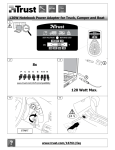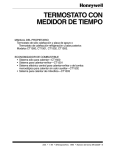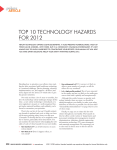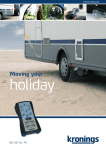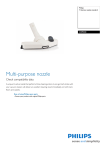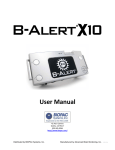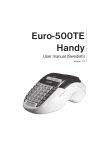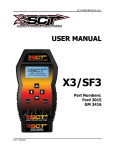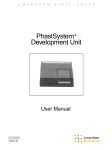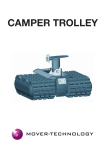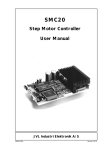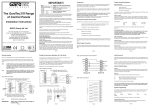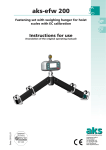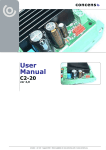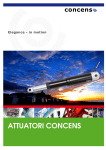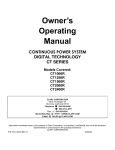Download user manual.
Transcript
CAMPER TROLLEY (EN) Model 2500 and Model 1500 Congratulations on the purchase of your new Camper Trolley, and thank you for choosing a product from MoverTechnology. It is important that you read this manual thoroughly before using your Camper Trolley. Unauthorized use or maintenance may result in voidance of the guarantee. WARNING NOTICE FOR BATTERY Charge the battery completely before first use! The Lithium battery installed in this machine has only been charged to part of its capacity (as freight regulations prescribe). It is vital that you charge the battery to its full capacity before operating the machine to ensure high performance and long life. Charging for the first time may take 6-8 hours (see recharging instructions). Always recharge fully after use until the LED light turns green! Recharge Periodically! If the Camper Trolley goes unused for more than two months, it is highly recommended to inspect and charge the battery until the LED on the charger changes from red to green, in order to maintain maximum battery life and performance. Do not store the Camper Trolley in direct sunlight or at high temperatures. High temperatures may drain the battery quickly. Failure to follow these instructions will damage the battery and void the battery’s warranty! Batteries: Charging and changing Battery for Camper Trolley 1. To charge the Camper Trolley battery, connect the charger to the Camper Trolley by placing the charging plug in the outlet on the back end cover. 2. The battery charger displays a constant red light while charging is in progress. Completion of battery charging is indicated by a constant green light. Battery Charger Charging Charging Outlet Battery Charger Fully Charged Changing the remote control battery 1. Loosen the 4 screws on the back of the remote control and remove the panel. 2. Replace the old battery with a new one of the same type. Remember to protect the environment when disposing of batteries – do not dispose of them with ordinary household waste. Technical Data Battery voltage Battery type Battery capacity Battery operating capacity Battery charger Remote control battery Max. load stress Speed unloaded Speed loaded Motor Safety function Hauling capacity Caterpillar tracks Weight Model 2500 14.8 Lithium Approx. 10,000 mAh Approx. 30 min. operation Model 1500 14.8V Lithium Approx. 5,000 mAh Approx. 30 min. operation 100-240 V, 2 A 2 x AA 1.5 Volt 300 kg Approx. 9 m/min. Approx. 7 m/min. 4 x DC motors 3 min. Auto shut-off. Trailers up to 2,500 kg 2 with rubber profiles Approx. 35 kg 100-240 V, 1 A 2 x AA 1.5 Volt 300 kg Approx. 9 m/min. Approx. 7 m/min. 2 x DC motors 3 min. Auto shut-off. Trailers up to 1,500 kg 2 with rubber profiles Approx. 20 kg Contents of carton When unpacking the Camper Trolley, please check that all parts are in the carton. If any of the items are missing: Contact your dealer. Operating Manual Camper Trolley Charger Remote control incl. 2x AA batteries Transport bag Model 2500 1 1 1 1 Model 1500 1 1 1 1 1 1 + Suspension fixture consisting of the following parts1: Security ring (cotter) 1 Outer mounting tube 1 Inner mounting tube 1 Extension for inner tube 1 Mounting bracket for 1 inner tube Female for mounting 1 Bracket Support plate for female 1 mounting bracket Clamp 1 + Screws and nuts for suspension fitting. 1 Not applicable in Australia and New Zealand. 1 1 1 1 1 1 0 0 EC DECLARATION OF CONFORMITY No.: 1 The manufacturer, and/or any authorized representative of the manufacturer within the European Community, hereinafter referred to as Mover-Technology ApS Dagmarsgade 17, DK-6760 Ribe declares that the products Camper Trolley CT1500 and Camper Trolley CT2500 have been manufactured in conformity with the provisions of the following EC directives · · · · · 98/37/EC – The Machinery Directive 99/5/EC – The R&TTE Directive 2004/108/EC – The EMC Directive 2002/95/EC – The RoHS Directive 2002/96/EC – The WEEE Directive and that all standards mentioned overleaf have been applied. The last two digits of the year of the CE approval: 12 Reference to standards (or parts hereof) applied in connection with this Declaration of Conformity: - harmonized standards: EN 953: 2003 Safety of Machinery - Guards – General requirements for the design and construction of fixed and movable guards EN 954-1:2003 Safety of Machinery. Safety-related parts of control systems. Part 1: General principles for design EN 1037:1998 Safety of Machinery – prevention of unexpected start-up EN 12100-1:2005 Safety of Machinery – Basic concepts and general principles for design – Part 1: Basic terminology, methodology EN 12100-2:2005 Safety of Machinery – Basic concepts and general principles for design – Part 2: Technical principles EN 13850:2006 Safety of Machinery – Emergency stop – Principles for design EN 13857:2008 Safety distances to prevent hazard zones being reached by upper and lower limbs EN 60204-1:2006 Safety of Machinery - Electrical equipment of machines - Part 1: General requirements Kronings ApS Helgolandsgade 40, DK-6700 Esbjerg, Denmark Before Use: Preparing the Camper Trolley Checking the status 1. Unpack the Camper Trolley and check that the Camper Trolley is clean and not broken 2. Make sure the Camper Trolley battery is charged according to instructions Mounting the suspension fitting – standard bracket REGIONAL VARIANTS Some countries and makes of caravan may require a special bracket version. Please inquire with your dealer. If there is a plastic cover over the side member system on the caravan, it can be helpful to remove it while mounting the suspension fitting. A1: Outer mounting tube Mounting bracket for inner mounting tube Inner extension tube Female for mounting bracket A2: Inner mounting tube 1. 2. When mounting the suspension fitting from the Camper Trolley onto the caravan, start by gliding the two mounting tubes, A1 and A2, together, and then placing them up inside the side members. Next, loosely screw on the mounting bracket to the inner mounting tube, and screw the female piece to the mounting bracket. If there are larger distances between side members, place the extension tube inside the inner mounting tube. The illustration below shows the assembled suspension fitting mounted on the side members2: 3. Slide the entire suspension fitting as far back on the side members as possible to put maximum weight on the Camper Trolley. Do not push the suspension fitting so far back that mounting and removing the Camper Trolley becomes difficult. The following illustration shows the optimal placement of the suspension fitting on the caravan: 4. 2 Push the Outer and Inner Mounting Tube as far from each other as possible, towards the sides of the side members. Tighten the left and right brackets so that the bent undersides of these are positioned precisely against the outer side of the side members. Make sure that the bolts are tightened to the maximum extent. (If the caravan’s bearers are extremely narrow, and the mounting tubes cannot be pressed far enough together upon mounting, you can use a hacksaw to shorten mounting tube A2. There must be minimum 10-15 cm inner overlap of the Outer and Inner mounting tubes.) Clamp and support plate for female mounting bracket only come with Model 2500. 5. Once the suspension fitting is adjusted and fastened to the side members, tighten the clamp bolt into the side of the inner mounting tube. Mounting of Camper Trolley 1. When mounting the Camper Trolley on the suspension fitting, adjust the height of the suspension fitting using the nose/jockey wheel. 2. The suspension fitting mounted on the Camper Trolley fits into a slit on the underside of the mounting fitting on the left side (seen from the ball catch) and can be pushed into place in this slot. 3. After pushing the Camper Trolley into the slot in the mounting fitting, attach the factory-provided cotter ring, which locks the Camper Trolley in place. 4. After attaching the cotter ring to the Camper Trolley, raise the support wheel to its highest position, and release the hand brake. This shifts the weight of the caravan onto the Camper Trolley. You are now ready to tow your caravan. Illustration of the Camper Trolley mounted on the side members of the caravan: VARIANTS CT2500 is equipped with a tall or low tower with ball joint CT2500 Tall tower CT2500 Height is adjustable Low tower Using the Camper Trolley 1. 2. 3. 4. SOME ADVICE ON SAFETY AND OPERATION BEFORE STARTING Familiarize yourself with the operating manual, and practice maneuvering the caravan on a flat surface before attempting to maneuver it on sloping surfaces. We recommend testing your Camper Trolley at home – also without a caravan – so you can try out the different maneuvering options. Load: The Camper Trolley is designed for moving caravans weighing up to approx. 2500 kg (Model CT2500) or 1500 kg (Model CT1500). In order for Camper Trolley to function optimally, the ball weight must be at least 75-85 kg. This ball weight creates about 120-150 kg of pressure on the Camper Trolley. Too little weight on the Camper Trolley may result in poor gripping and poor towing results. Greatest pressure is achieved by mounting the Camper Trolley as far back on the side members as possible. Level surfaces: To ensure optimal transfer of the Camper Trolley’s power to the surface it is to operate on, the Camper Trolley must move in the direction of the antenna, i.e. forward. (Except on sloping surfaces, see below). Sloping surfaces: Operating the Camper Trolley on sloping surfaces may shift and decrease the pressure on the Camper Trolley, resulting in poor contact with the terrain. o When using your Camper-Trolley to move your caravan or trailer UP a slope or edge, the CT must PUSH the caravan up the slope – if necessary, one wheel at a time. Optionally, use a ramp. o When moving your caravan DOWN a slope the CT must LEAD the caravan DOWN the slope. ATTENTION: If going downhill, it is very important that the Camper Trolley is turned 180 degrees, so that it is moving in reverse, down the hill, i.e. with the antenna opposite the maneuvering direction and facing the caravan. This is important, as the Camper Trolley might otherwise tip over forward. Special precaution 5. Be aware that if towing down very steep inclines or on wet, oily surfaces, it may be necessary to use the hand brake on your caravan during operation if the Camper Trolley is unable to hold the caravan or the caterpillar tracks cannot adequately grip the surface. Activating and Pairing the Camper Trolley with the remote control The Camper Trolley comes pre-paired with the remote control. Turn on the Camper Trolley by simply pressing the Start/Stop button for maximum 1-2 seconds. Turn on the remote control by pushing the forward button () once. The Camper Trolley is now ready to use. IMPORTANT Re-pairing the Camper Trolley 1. Turn on the Remote Control by pushing the Forward button () once. The green light on the Remote Control will turn on. 2. Turn on the Camper Trolley by clicking the Start/Stop button. The green light on the Camper Trolley will turn on. 3. Now simultaneously press and hold the Turn right button () on the Remote Control and press and hold the Start/Stop button on the Camper Trolley, both LED lights start to blink for 8 seconds, after which the LED lights will light constantly. Now the Camper Trolley and Remote Control have been re-paired and are ready to use. If this pairing procedure is unsuccessful, the Remote Control will turn off automatically in around 15 seconds, and the user needs to redo the procedure from step 1. The start/stop button and operating status indicator are located on the front of the Camper Trolley (The diode lighting can be difficult to see in strong sunlight): Operating Status The maneuvering buttons on the remote control: Forward: ();Turn right: () Backward: ();Turn left: () Start/Stop Button Battery Indicator The battery indicator shows the Camper Trolley’s remaining battery status. If the capacity is too low, the CT may not respond correctly. If the indicator itself weakens, the remote control battery needs to be replaced, otherwise the CT may not respond correctly. Maneuvering the Camper Trolley The Camper Trolley logo on the remote control must always point toward the trolley. Use both hands on the remote control, and hold it horizontally during use. - Forward: To move forward, in the same direction as the antenna, hold down forward button (). Backward: To move backward/reverse, hold down the back button (). Turn: To turn, hold down the forward () or backward () button while at the same time holding down one of the turn buttons of the remote control to turn right () or left (). The Camper Trolley will only turn if you first hold the forward or backward button, followed by a turn button. Stop: To stop the Camper Trolley from moving, simply release the forward or backward button. Deactivating the Camper Trolley The Camper Trolley shuts off automatically after 3 minutes if the remote control is not activated within that period. If you do not want to wait 3 minutes until the Camper Trolley shuts off automatically, press the start/stop button to disconnect the power manually on the Camper Trolley. Turn off the Remote Control LED light by holding down the Right Button (), and then pressing the left button() at the same time After Use: Detaching, Cleaning, Storing, and Maintenance Detaching the Camper Trolley Never leave the Camper Trolley mounted to the caravan while towing the caravan behind a car. It is important that you always detach the Camper Trolley after use and place it in the storage box/bag together with the remote control. When you have finished towing the caravan and you want to disconnect the Camper Trolley, pull the parking brake and adjust the nose/jockey wheel so that the caravan is slightly elevated. This takes the weight off the Camper Trolley. Remove the cotter ring and use the remote control to move the Camper Trolley out of the lock fitting (or pull it out manually). Cleaning If you have used the Camper Trolley in wet or dirty conditions, you can clean it in the following manner: Remove pebbles, clay, grass and the like from the belts. Then give it a gentle cleaning using a small amount of clean water and a brush or cloth. Do not use soap or cleansing agents or a high-pressure cleaner. Storage Put the Camper Trolley in the transport box/bag delivered from the factory. If the storage box/bag should become damaged, discard it. A new plastic storage box/bag may be obtained from your Camper Trolley distributor. Store the Camper Trolley in dry, frost-free conditions. Do not store the Camper Trolley in direct sunlight or at high temperatures. High temperatures may drain the battery quickly. Maintenance The Camper Trolley should be operated at least every second month in order to keep the battery healthy. If the Camper Trolley goes unused for more than two months, it is highly recommended that you operate the Camper Trolley for a short while and then charge the battery until the LED on the charger turns green, in order to maintain maximum battery life and performance. Repair Please contact your local dealer for repair issues. Complaints In case of any claim regarding this product, please contact your dealer and provide information about: The cause of the error or defect and the date of purchase. Present your invoice as proof of purchase. Children Note that children under age 3 should not play with any plastic bags or small parts from the Camper Trolley, as there is a risk of suffocation. Children should not tow the caravan with the remote control. Kronings ApS Helgolandsgade 40, DK-6700 Esbjerg, Denmark www.kronings.com








